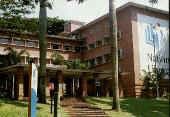In Your Neighbourhood#8- Chek Jawa
Broadcast Date : 02/01/02
Prime Minister Goh Chok Tong called for greater social cohesion and citizen involvement in the governance of the country.
Prior to Mr Goh's speech, many other leaders have spoken and many feature articles written about this need for greater citizen participation in Singapore.
In the literal backwaters of Singapore, a place named Chek Jawa may yet prove to be the chrysalis this much hoped-for the fledgling civil society.
Hi welcome to In Your Neighbourhood with me, Chong Ching Liang.
This week, we looked at how an obscure corner of Pulau Ubin is rescued.
Public works and plans aren't made over night.
Usually these plans are made way in advance, sometimes over a decade ago.
But unfortunately, sometimes, when these plans are announced nondescriptly, their implications skipped people by and aren't noticed until it's too late.
That was the pattern that condemned the National Library building in Stamford Road.
When Singaporeans discovered the National Library is really to be demolished, a public frenzy happened.
Letters after letters were sent in to the media and government offices in the hope that a stay of execution would be granted.
But to no avail.
That refreshing burst of civic energy yielded nothing and the more cynical of observers feared the disillusioned masses would give up on the civil society.
But wait!
A little treasure trove of biodiversity in Pulau Ubin has restored some modicum of faith.
Biologist N. Sivasothi, a researcher with the Raffles Museum of Biodiversity
"So at the eleventh hour, the very exciting news that came out of this press release was they want to protect the marine life. They have suddenly said 'Ugh, Okay! We have received a lot of input from the public and from groups and from individuals, lets examine their concerns. Lets see how we can work this out lah.'"
Chek Jawa is granted a stay of execution.
How valuable is the place?
President of the Nature Society of Singapore, Dr Geh Min.
"Yes, well, its not as valuable to nature. Its valuable to everyone in Singapore. Its the very very rich biodiversity of this area. Probably the only one of its kind left. Unless we discover another one, which is highly unlikely."
The shorelines of land scarce Singapore has been decimated by reclamation and its lucrative port trade.
In Chek Jawa, microcosms of marine life that used to dot Singapore coastline miraculously survived, a breathing time capsule.
Dr Geh Min again.
"Its got many different habitats there and they're all relatively unspoilt. Its got sand and mud flats, its got mangrove, its got rocky shore. All of these habitats are home to, oh! It's such a rich diversity of marine life I can't begin to describe it. Just standing there and looking around, you just see so much."
Nature Society has played a pivotal role as the non-governmental organisation, or NGO, representing nature lovers but Dr Geh Min refused full credits.
"Well of course we would like to take some credit but I really think that this is an example of how quickly and how sensitively the government responded to publicly feedback. And of course, Nature Society and other NGOs are public voice."
Unlike a couple of years ago, this time round, the public outpouring of love and affections managed to save a nation's heritage.
Dr Geh ruminates on what worked this time.
"well, there would be two decisive factors. One, it was really the realisation of the rich biodiversity which they actually took the trouble to go down and see for themselves, including I believe, the Minister himself and many of the top decision makers. But the second factor was the fact that the public, and I am not just talking about the NGOs and nature groups, I am talking about individual members of the public. There was obviously so much interest in the area and of course the media help."
The biggest lift the save-Chek Jawa campaigners received is the unexpected support from even non-nature buffs.
"Just looking at some of the photos made everyone wants to rush down to that place and they did. And the government is very sensitive to this. They realise that Singaporeans enjoy nature, place a lot of value in it. Apparently, this causes the change in decision to reclaim the land."
Ironically, the mad rush to Chek Jawa is caused by Singaporeans thinking that it's their last chance to see the place.
For Chek Jawa, its existence is still under threat but at least, experts are being sort now to maximise its survival.
"Yes, I think they are moving the reclamation further west but this is still, I believe, open to feedback and recommendation and they will be consulting. It's still an on-going process from what I understand from the next two weeks. Anyone who has a reasonable opinion on how best to proceed with the reclamation so as not to damage Chek Jawa, is free to give their two cents worth."
Is Chek Jawa worth all the efforts? Biologist Sivasthoty again.
"Some of us, I mean, we have been cracking our brains, have we seen a place like this in Malaysia? We are not sure yet. You know? So it's interestingly unique, and of course for Singapore, it's practically a national treasure lah."
It is a treasure in more ways than just being a nature reserve.
Chek Jawa now is the metaphor for what Singaporeans can achieve if they activate their sense of civic duty.
This is Chong Ching Liang, for Newsradio 938.
Related websites:
Virtual Tour of Chek Jawa
http://habitatnews.nus.edu.sg/news/chekjawa/ria/index.html
Raffles Museum of Biodiversity
http://rmbr.nus.edu.sg/
Nature Society of Singapore
http://www.nss.org.sg/
Newsradio 938
newsradio.mediacorpradio.com
Blogarama
Prime Minister Goh Chok Tong called for greater social cohesion and citizen involvement in the governance of the country.
Prior to Mr Goh's speech, many other leaders have spoken and many feature articles written about this need for greater citizen participation in Singapore.
In the literal backwaters of Singapore, a place named Chek Jawa may yet prove to be the chrysalis this much hoped-for the fledgling civil society.
Hi welcome to In Your Neighbourhood with me, Chong Ching Liang.
This week, we looked at how an obscure corner of Pulau Ubin is rescued.
Public works and plans aren't made over night.
Usually these plans are made way in advance, sometimes over a decade ago.
But unfortunately, sometimes, when these plans are announced nondescriptly, their implications skipped people by and aren't noticed until it's too late.
That was the pattern that condemned the National Library building in Stamford Road.

When Singaporeans discovered the National Library is really to be demolished, a public frenzy happened.
Letters after letters were sent in to the media and government offices in the hope that a stay of execution would be granted.
But to no avail.
That refreshing burst of civic energy yielded nothing and the more cynical of observers feared the disillusioned masses would give up on the civil society.
But wait!
A little treasure trove of biodiversity in Pulau Ubin has restored some modicum of faith.

Biologist N. Sivasothi, a researcher with the Raffles Museum of Biodiversity
"So at the eleventh hour, the very exciting news that came out of this press release was they want to protect the marine life. They have suddenly said 'Ugh, Okay! We have received a lot of input from the public and from groups and from individuals, lets examine their concerns. Lets see how we can work this out lah.'"
Chek Jawa is granted a stay of execution.
How valuable is the place?
President of the Nature Society of Singapore, Dr Geh Min.
"Yes, well, its not as valuable to nature. Its valuable to everyone in Singapore. Its the very very rich biodiversity of this area. Probably the only one of its kind left. Unless we discover another one, which is highly unlikely."
The shorelines of land scarce Singapore has been decimated by reclamation and its lucrative port trade.
In Chek Jawa, microcosms of marine life that used to dot Singapore coastline miraculously survived, a breathing time capsule.
Dr Geh Min again.
"Its got many different habitats there and they're all relatively unspoilt. Its got sand and mud flats, its got mangrove, its got rocky shore. All of these habitats are home to, oh! It's such a rich diversity of marine life I can't begin to describe it. Just standing there and looking around, you just see so much."
Nature Society has played a pivotal role as the non-governmental organisation, or NGO, representing nature lovers but Dr Geh Min refused full credits.
"Well of course we would like to take some credit but I really think that this is an example of how quickly and how sensitively the government responded to publicly feedback. And of course, Nature Society and other NGOs are public voice."
Unlike a couple of years ago, this time round, the public outpouring of love and affections managed to save a nation's heritage.
Dr Geh ruminates on what worked this time.
"well, there would be two decisive factors. One, it was really the realisation of the rich biodiversity which they actually took the trouble to go down and see for themselves, including I believe, the Minister himself and many of the top decision makers. But the second factor was the fact that the public, and I am not just talking about the NGOs and nature groups, I am talking about individual members of the public. There was obviously so much interest in the area and of course the media help."
The biggest lift the save-Chek Jawa campaigners received is the unexpected support from even non-nature buffs.
"Just looking at some of the photos made everyone wants to rush down to that place and they did. And the government is very sensitive to this. They realise that Singaporeans enjoy nature, place a lot of value in it. Apparently, this causes the change in decision to reclaim the land."
Ironically, the mad rush to Chek Jawa is caused by Singaporeans thinking that it's their last chance to see the place.
For Chek Jawa, its existence is still under threat but at least, experts are being sort now to maximise its survival.
"Yes, I think they are moving the reclamation further west but this is still, I believe, open to feedback and recommendation and they will be consulting. It's still an on-going process from what I understand from the next two weeks. Anyone who has a reasonable opinion on how best to proceed with the reclamation so as not to damage Chek Jawa, is free to give their two cents worth."
Is Chek Jawa worth all the efforts? Biologist Sivasthoty again.
"Some of us, I mean, we have been cracking our brains, have we seen a place like this in Malaysia? We are not sure yet. You know? So it's interestingly unique, and of course for Singapore, it's practically a national treasure lah."
It is a treasure in more ways than just being a nature reserve.
Chek Jawa now is the metaphor for what Singaporeans can achieve if they activate their sense of civic duty.
This is Chong Ching Liang, for Newsradio 938.
Related websites:
Virtual Tour of Chek Jawa
http://habitatnews.nus.edu.sg/news/chekjawa/ria/index.html
Raffles Museum of Biodiversity
http://rmbr.nus.edu.sg/
Nature Society of Singapore
http://www.nss.org.sg/
Newsradio 938
newsradio.mediacorpradio.com
Blogarama

